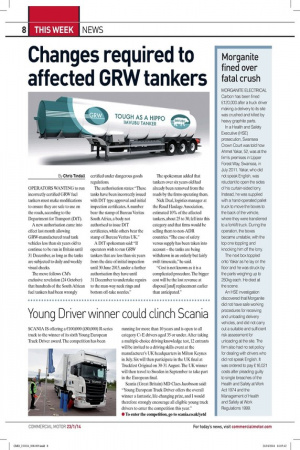Changes required to affected GRW tankers
Page 7

If you've noticed an error in this article please click here to report it so we can fix it.
By Chris Tindall
OPERATORS WANTING to run incorrectly certified GRW fuel tankers must make modifications to ensure they are safe to use on the roads, according to the Department for Transport (DfT).
A new authorisation came into effect last month allowing GRW-manufactured road tank vehicles less than six years old to continue to be run in Britain until 31 December, as long as the tanks are subjected to daily and weekly visual checks. The move follows CMs exclusive revelation (24 October) that hundreds of the South African fuel tankers had been wrongly
certified under dangerous goods regulations.
The authorisation states: "These tanks have been incorrectly issued with DfT type approval and initial inspection certificates. A number bear the stamp of Bureau Veritas South Africa, a body not authorised to issue DfT certificates, while others bear the stamp of Bureau Veritas UK."
A DfT spokesman said: "If operators wish to run GRW tankers that are less than six years from the date of initial inspection until 30 June 2015, under a further authorisation they have until 31 December to undertake repairs to the man-way neck rings and bottom off-take nozzles."
The spokesman added that tankers over six years old had already been removed from the roads by the firms operating them.
Nick Deal, logistics manager at the Road Haulage Association, estimated 10% of the affected tankers, about 25 to 30, fell into this category and that firms would be selling them to non-ADR countries. "The case of safety versus supply has been taken into account — the tanks are being withdrawn in an orderly but fairly swift timescale," he said.
"Cost is not known as it is a complicated procedure. The bigger cost will be the lost revenue at disposal [and] replacement earlier than anticipated."












































